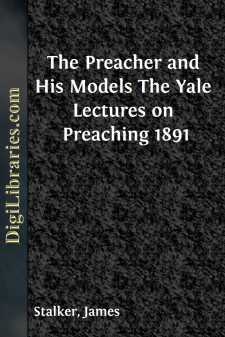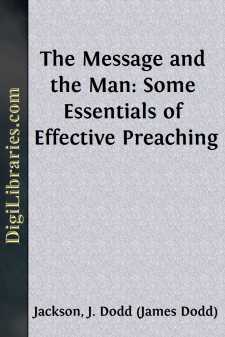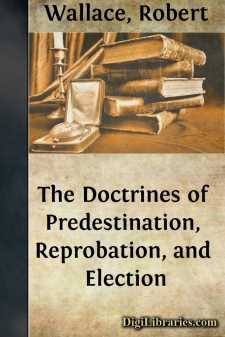Non-Classifiable
- Non-Classifiable 1768
Non-Classifiable Books
Sort by:
I "All talk on modern poetry, by people who know," wrote Mr. Carl Sandburg in Poetry, "ends with dragging in Ezra Pound somewhere. He may be named only to be cursed as wanton and mocker, poseur, trifler and vagrant. Or he may be classed as filling a niche today like that of Keats in a preceding epoch. The point is, he will be mentioned." This is a simple statement of fact. But though...
more...
by:
William James
The lectures that follow were delivered at the Lowell Institute in Boston in November and December, 1906, and in January, 1907, at Columbia University, in New York. They are printed as delivered, without developments or notes. The pragmatic movement, so-called—I do not like the name, but apparently it is too late to change it— seems to have rather suddenly precipitated itself out of the air. A...
more...
by:
William James
THE pivotal part of my book named Pragmatism is its account of the relation called 'truth' which may obtain between an idea (opinion, belief, statement, or what not) and its object. 'Truth,' I there say, 'is a property of certain of our ideas. It means their agreement, as falsity means their disagreement, with reality. Pragmatists and intellectualists both accept this...
more...
by:
James Stalker
LECTURE I. INTRODUCTORY. Gentlemen, it would be impossible to begin this course of lectures without expressing my acknowledgments to the Theological Faculty of this University for the great honour they have done me by inviting me to occupy this position. When I look over the list of my predecessors and observe that it includes such names as Bishop Simpson, Henry Ward Beecher, Dr. John Hall, Dr. W.M....
more...
by:
John Mastin
CHAPTER I. INTRODUCTORY. What constitutes a precious stone is the question which, at the onset, rises in the mind, and this question, simple as it seems, is one by no means easy to answer, since what may be considered precious at one time, may cease to be so at another. There are, however, certain minerals which possess distinctive features in their qualities of hardness, colour, transparency,...
more...
The Designation of the Preacher. The preaching of the Gospel is more than a mere utterance of certain historical facts with deductions therefrom; more than a declaration of certain doctrines with their applications. It is a highly complex intellectual, moral and spiritual act. Two men may deliver the same sermon. There may be similarity of voice, of manner, of delivery, but one of these men will preach...
more...
INTRODUCTION Because of the rapid increase in knowledge about precious stones on the part of the buying public, it has become necessary for the gem merchant and his clerks and salesmen to know at least as much about the subject of gemology as their better informed customers are likely to know. In many recent articles in trade papers, attention has been called to this need, and to the provision which...
more...
by:
Francis Bacon
INTRODUCTORY NOTE _No part of a book is so intimate as the Preface. Here, after the long labor of the work is over, the author descends from his platform, and speaks with his reader as man to man, disclosing his hopes and fears, seeking sympathy for his difficulties, offering defence or defiance, according to his temper, against the criticisms which he anticipates. It thus happens that a personality...
more...
by:
Robert Wallace
Were a number of shipwrecked mariners cast upon an island, one of their first inquiries would be, Is it inhabited? Having observed footmarks upon the sand, and other tokens of man’s presence, another question would be, What is the character of the people? Are they anthropophagi, or are they of a friendly disposition? The importance of such questions would be realised by all. Their lives might depend...
more...
by:
Bernard Shaw
BERNARD SHAW N.B. The Euripidean verses in the second act of Major Barbara are not by me, or even directly by Euripides. They are by Professor Gilbert Murray, whose English version of The Baccha; came into our dramatic literature with all the impulsive power of an original work shortly before Major Barbara was begun. The play, indeed, stands indebted to him in more ways than one. G. B. S. Before...
more...











